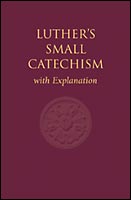Prayer Without Ceasing
Q: What does it mean to pray without ceasing? What does it look like and how should we develop it in our lives?
 A: Saint Paul wrote, “Rejoice always, pray without ceasing, give thanks in all circumstances; for this is the will of God in Christ Jesus for you. (1 Thessalonians 5:16-18)” Obviously it cannot mean hands folded and heads bowed through every waking moment. Nor can we unendingly “pray, lifting holy hands. (1 Timothy 2:8)” Either of these would interfere with us fulfilling our God-given vocations — and often make driving quite unsafe.
A: Saint Paul wrote, “Rejoice always, pray without ceasing, give thanks in all circumstances; for this is the will of God in Christ Jesus for you. (1 Thessalonians 5:16-18)” Obviously it cannot mean hands folded and heads bowed through every waking moment. Nor can we unendingly “pray, lifting holy hands. (1 Timothy 2:8)” Either of these would interfere with us fulfilling our God-given vocations — and often make driving quite unsafe.I think rather that the apostle provides the Holy Spirit’s two-fold desire for Christian prayer. First of all, our entire lives should submit to the Word and will of God. Years ago, I wrote in The Purpose of Prayer that prayer isn’t getting our way but rather being aligned with God’s way: “Prayer doesn’t change God’s mind — it changes ours, bending our wills to His perfect will.... God teaches us that He isn’t a vending machine wherein we pop in a petition and He drops our order into our hands.” Thus, part of prayer “without ceasing” means living with a reverent, submissive, and thankful attitude toward our heavenly Father, trusting that in all things, His will be done.
Secondly, I understand “without ceasing” as regularity of prayer. We don’t pray only when we have problems, when family members are sick or near death, or when we’ve exhausted all earthly helps. Instead, in good times and bad, Christians day by day seek to carry everything to God in prayer. Each day provides opportunities to ask for forgiveness, to intercede on behalf of others (including our enemies), to seek spiritual and earthly blessings for ourselves, to thank God for all He has done for us, and to simply praise Him “just because” He is God Almighty.
 Lived out, a life of prayer without ceasing could reflect the pattern expressed in the Lutheran Small Catechism. Here, each morning and evening, the Christian is encouraged to “make the sign of the holy cross and say: ‘In the name of the Father and of the Son and of the Holy Spirit. Amen.’ Then, kneeling or standing, repeat the Creed and the Lord’s Prayer.” We might also pray additional prayers at these times. Other prayers including the Lord’s Prayer, are encouraged at the beginning and end of our meals. However you schedule yourself, remember that God hears, encourages, and demands His children’s prayers.
Lived out, a life of prayer without ceasing could reflect the pattern expressed in the Lutheran Small Catechism. Here, each morning and evening, the Christian is encouraged to “make the sign of the holy cross and say: ‘In the name of the Father and of the Son and of the Holy Spirit. Amen.’ Then, kneeling or standing, repeat the Creed and the Lord’s Prayer.” We might also pray additional prayers at these times. Other prayers including the Lord’s Prayer, are encouraged at the beginning and end of our meals. However you schedule yourself, remember that God hears, encourages, and demands His children’s prayers.Many hymnals and devotion books also provide frameworks for daily and weekly prayers. Some suggest special topics for each day, often based upon some Biblical event that happened on that same day. For instance, we might pray for a right reception of Holy Communion each Thursday, since our Lord instituted His Supper on that day. Our pattern may also be influenced by everyday life. For example, Monday suggests that we pray both for Godly labor and for the unemployed, since this is normally the day people return to work after their weekend rest.
Some years ago, The Lutheran Church — Missouri Synod (LCMS) put together this Guide for Daily Prayers in PDF format. It begins with a short set of suggestions for praying and day-by-day recommendations for prayer topics. Then follow four brief prayer and Scripture devotional services for morning, noon, early evening, and close of day. These may be used either by individuals or by groups in a combination of unison and responsive readings, such as a family gathered for a meal or just before bed.
 If you have no other organized, systematic plan, this guide will certainly help you get started. And even if you’ve been praying for years, perhaps even gathering together around a family altar, you could travel far before discovering a more useful, practical took for maintaining focus in your prayer life.
If you have no other organized, systematic plan, this guide will certainly help you get started. And even if you’ve been praying for years, perhaps even gathering together around a family altar, you could travel far before discovering a more useful, practical took for maintaining focus in your prayer life.Martin Luther suggest that we daily pray the Catechism. His intent wasn’t that we wade through the hundreds of pages in many modern printings of Lutheran, Catholic, and other catechisms, since these are filled with commentary, references, and supplemental material. Rather, he meant that we daily confess and ponder the central teachings of Christianity, particularly the Ten Commandments, the Creed, and the Our Father.
The Lutheran Small Catechism also leads us to pray about our lives as baptized believers, repentance and forgiveness of sins, proper preparation for receiving the Lord’s Supper. It includes brief orders for our daily prayers. The Scriptures involving in the Table of Duties involve various vocations and places in life and provide even more objects for our concern and subjects for our prayers.If you don’t own a catechism, you may download or print one in PDF. Other versions also are available; see the Small Catechism page at the Book of Concord site.
 I also invite you to read Structure for Daily Prayer. Here I talked a bit about my own prayer life and also provided other resources and references for others to use.
I also invite you to read Structure for Daily Prayer. Here I talked a bit about my own prayer life and also provided other resources and references for others to use.Finally, ponder what the Holy Spirit says so well through Saint Paul: “First of all, then, I urge that supplications, prayers, intercessions, and thanksgivings be made for all people, for kings and all who are in high positions, that we may lead a peaceful and quiet life, godly and dignified in every way. This is good, and it is pleasing in the sight of God our Savior, who desires all people to be saved and to come to the knowledge of the truth.... I desire then that in every place the men should pray, lifting holy hands without anger or quarreling. (1 Timothy 2:1-4, 8)”
Daily prayer quote from Luther’s Small Catechism, © 1991 by Concordia Publishing House.
Scripture quoted from The Holy Bible, English Standard Version™, © 2001 by Crossway Bibles.
Send email to Ask the Pastor.
Walter Snyder is the pastor of Holy Cross Lutheran Church, Emma, Missouri and coauthor of the book What Do Lutherans Believe.
Technorati Tags: pray without ceasing | praying | daily prayer | prayer | prayer books | home altar | family altar | devotions | meditations | Small Catechism | Luther’s Small Catechism | faith | theology | practical theology | worship | doctrine | Martin Luther | Book of Concord | Lutheran Confessions | Lutheran | confessional Lutheran | Lutheranism | Christian | Christianity | Holy Bible | Scripture | Word of God | God’s Word | Lord’s Prayer | Our Father | Apostles’ Creed | Ask the Pastor

0 Comments:
Post a Comment
<< Home